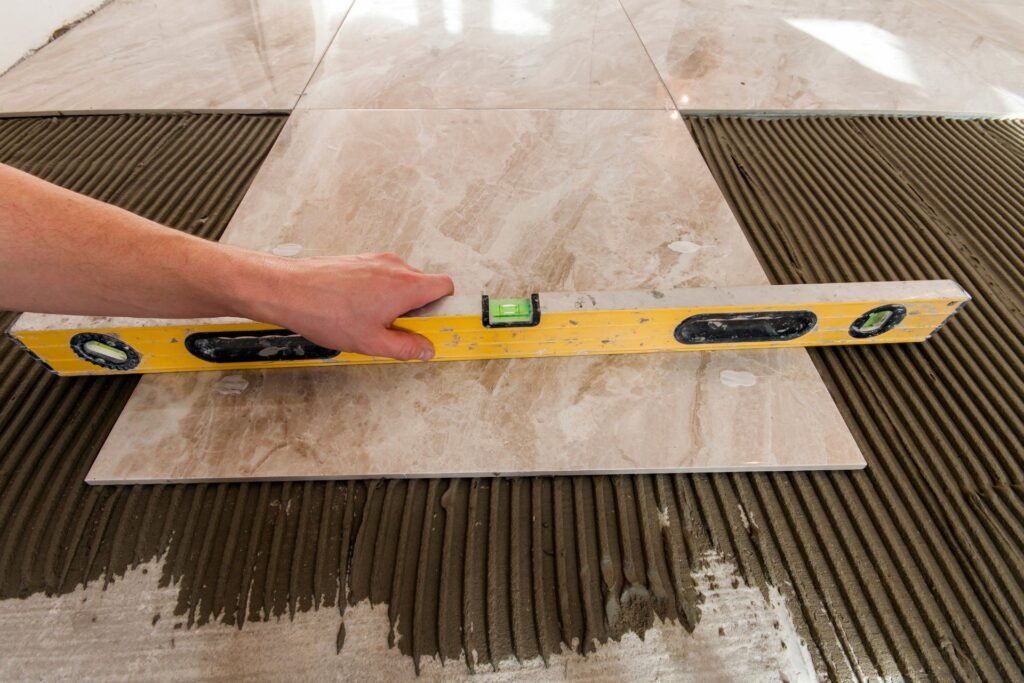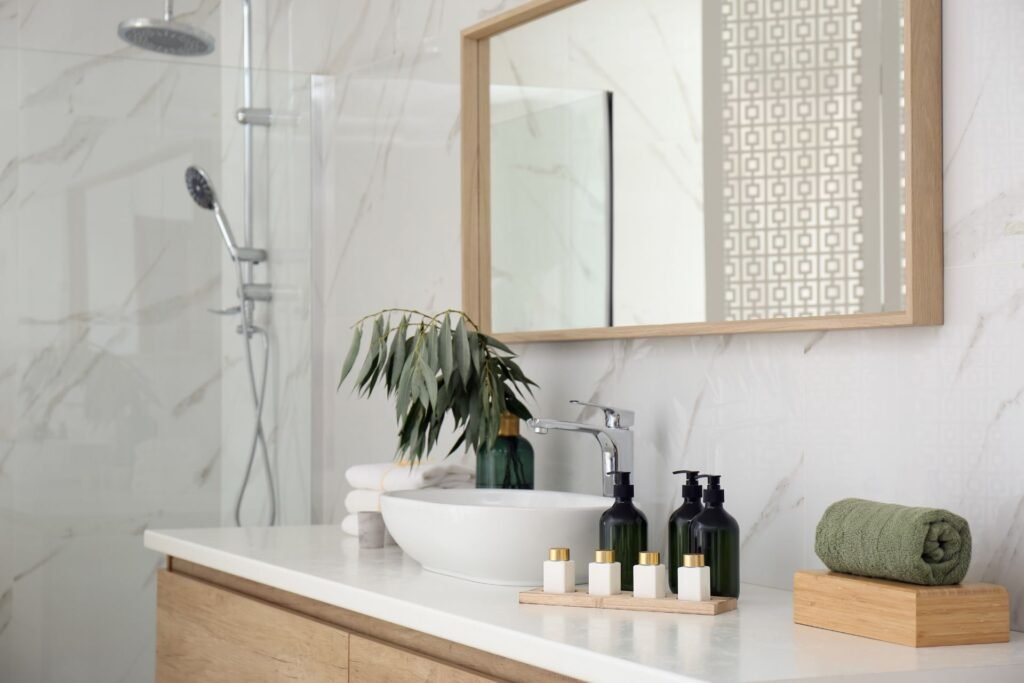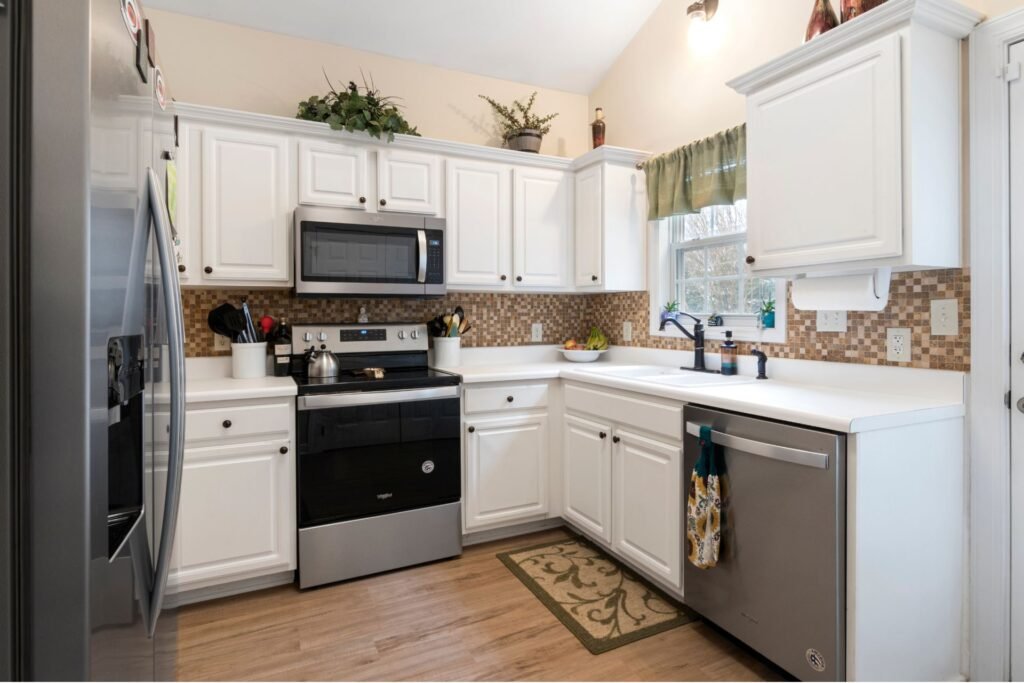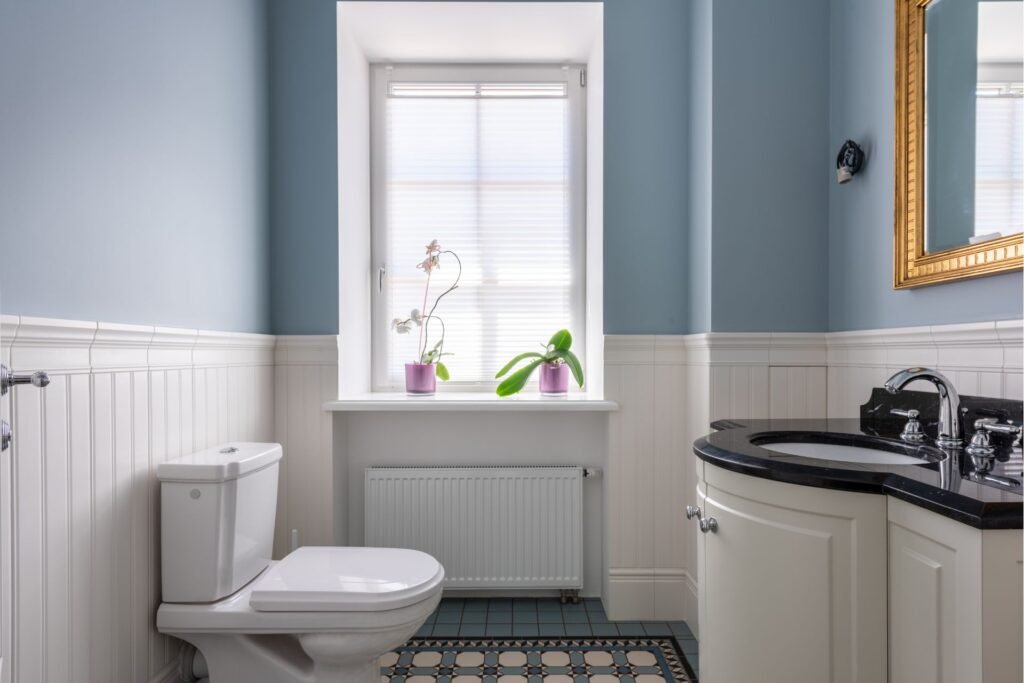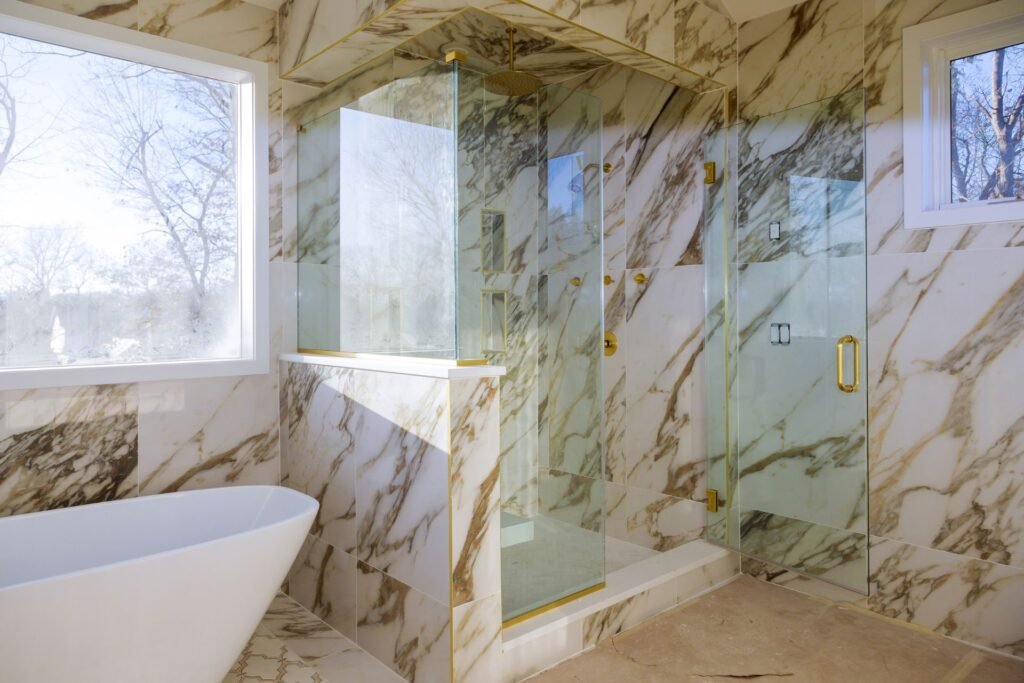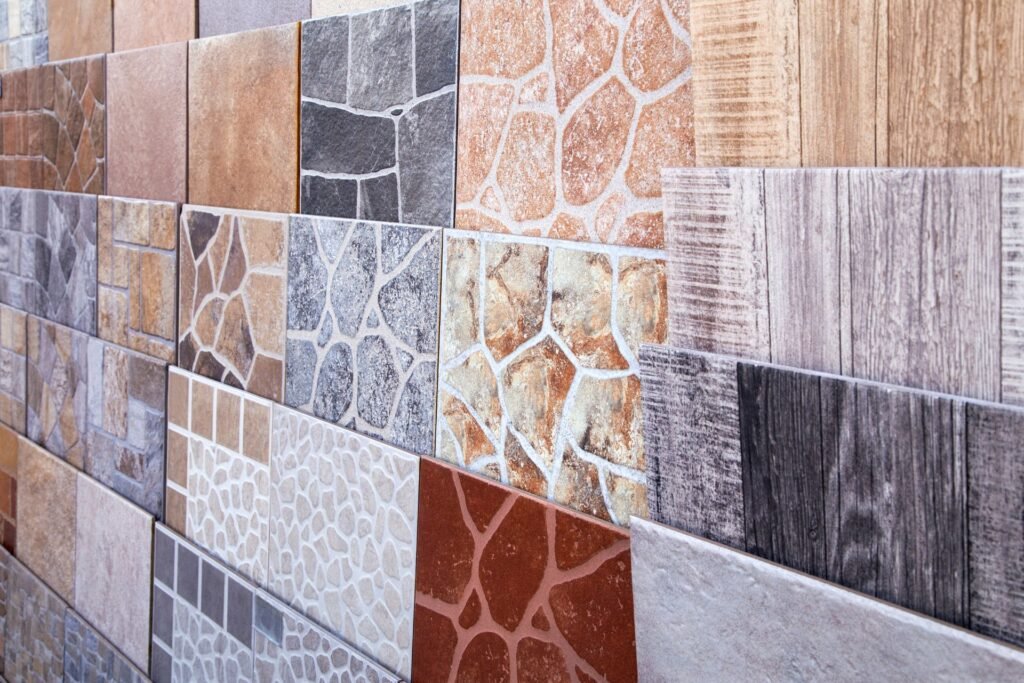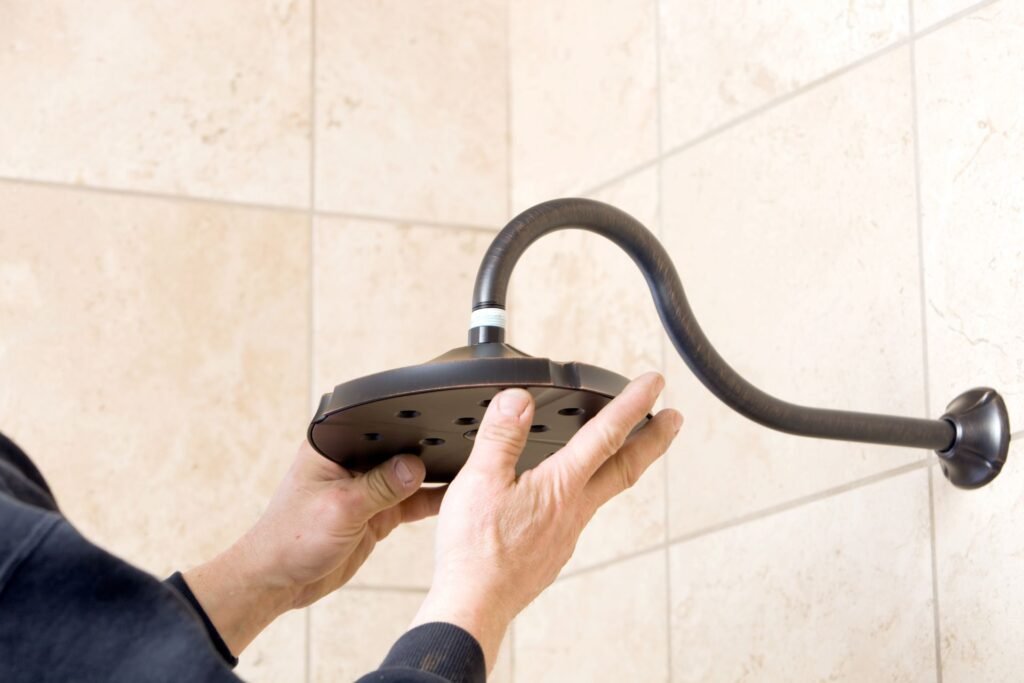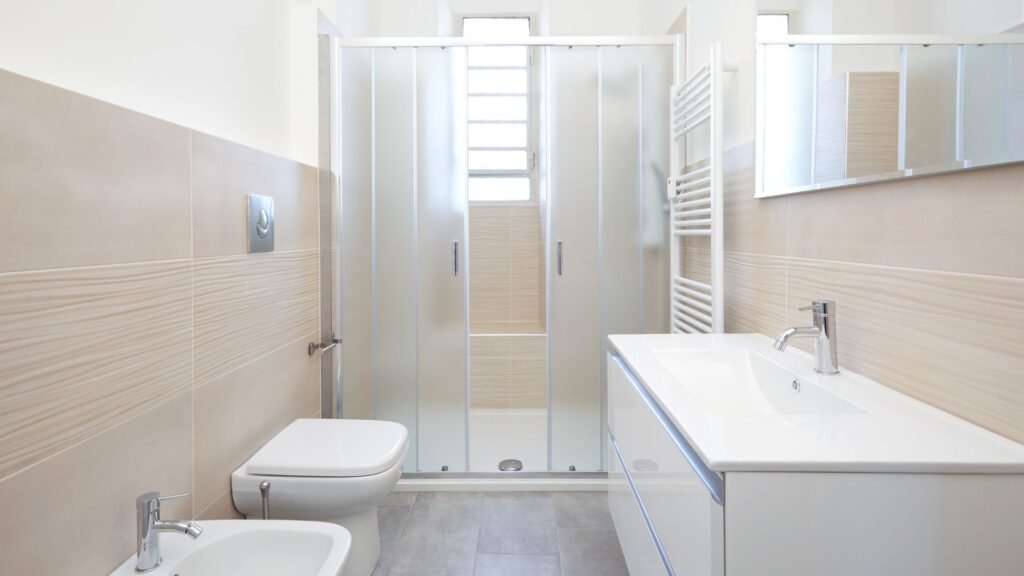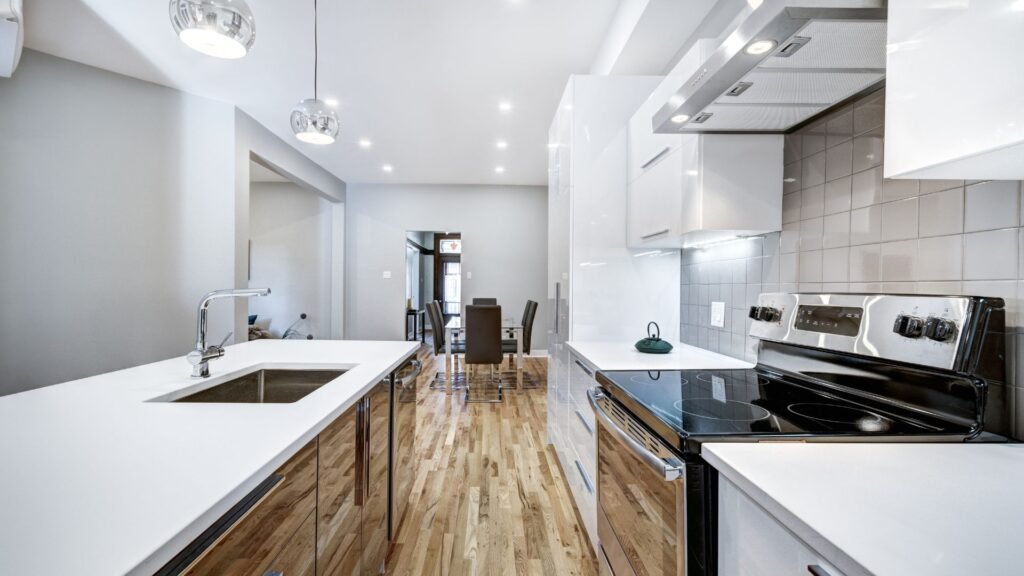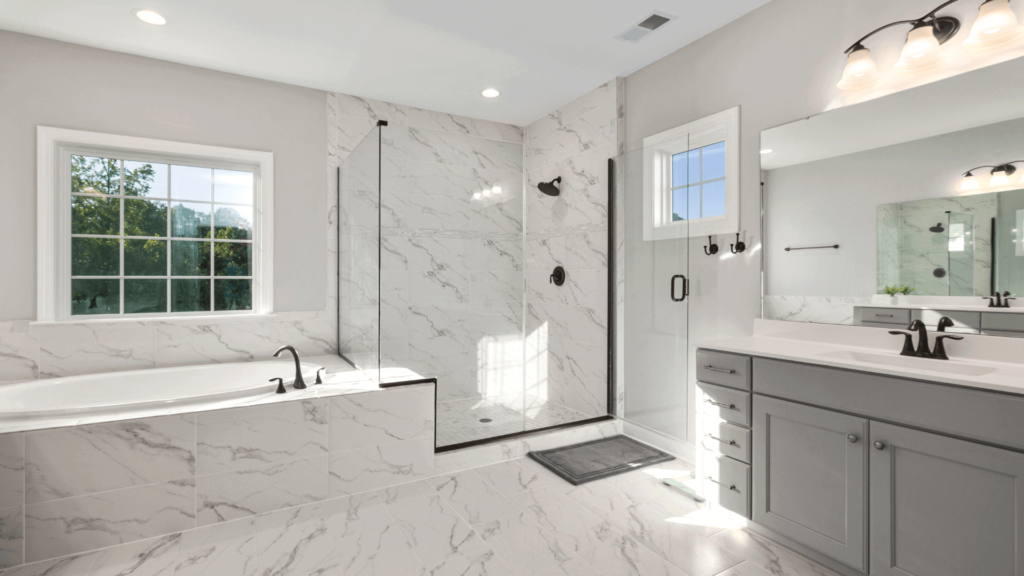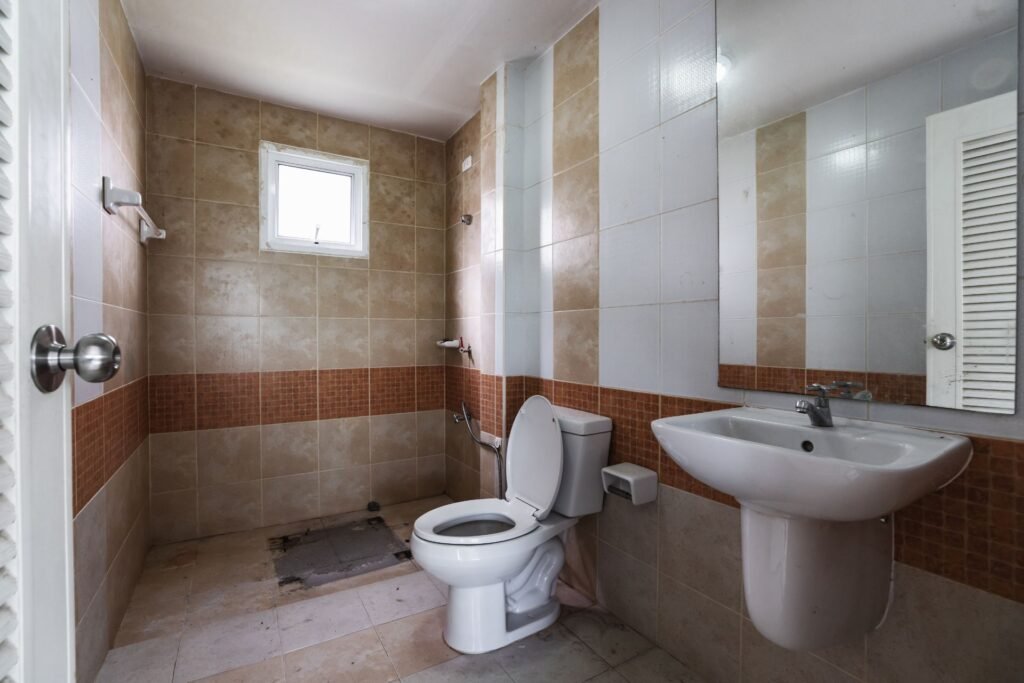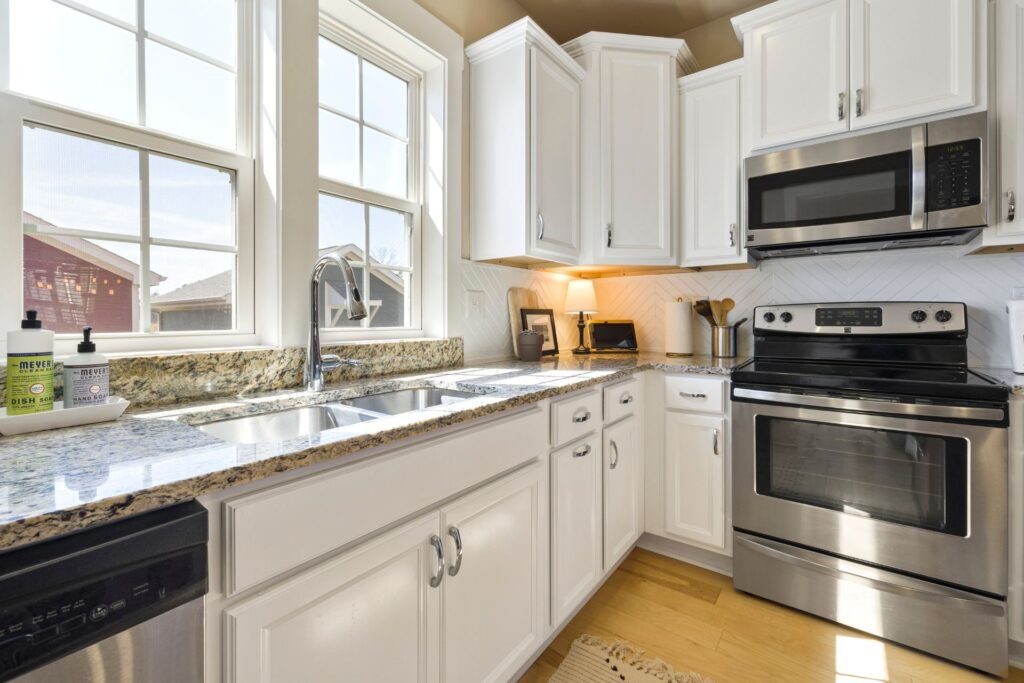Welcome to your ultimate guide on the cost to replace flooring in your bathroom in New Zealand. Whether you’ve noticed some wear and tear, or you’re simply ready to refresh your space, bathroom flooring is more than just a design element—it’s an investment in both function and style. Replacing your bathroom floor can seem daunting, but understanding the various factors such as material choices, labor costs, and hidden expenses can make the process smoother. In this guide, we’ll explore everything from the average costs of different flooring types to tips on how to save money, ensuring you’re well-prepared to make the best decision for your home and budget.
The cost to replace bathroom flooring in New Zealand varies based on material choice, labor, and bathroom size. On average, expect to pay between $100 to $250 per square meter, including materials like vinyl, tiles, or laminate. Additional costs may include subfloor repairs, waterproofing, and removal of old flooring. Getting multiple quotes and timing the renovation during off-peak seasons can help reduce costs.
- Factors Influencing The Cost Of Bathroom Flooring Replacement
- Average Costs Of Different Bathroom Flooring Materials In NZ
- Hidden Costs To Consider When Replacing Bathroom Flooring
- Cost Breakdown: Professional Vs. DIY Flooring Replacement
- Typical Price Ranges For Bathroom Flooring Replacement Across NZ
- Tips To Save Money On Bathroom Flooring Replacement
- Case Studies: Examples Of Flooring Replacement Costs
- How To Choose The Right Bathroom Flooring For Your Needs
- FAQs: About Cost To Replace Flooring In Bathroom NZ
- What is the average cost to replace bathroom flooring in NZ?
- Which bathroom flooring materials are the most cost-effective?
- How much does it cost to hire a professional to replace bathroom flooring in NZ?
- Is it cheaper to replace bathroom flooring myself?
- What hidden costs should I consider when replacing bathroom flooring?
- How do bathroom size and layout affect the cost of replacing flooring?
- What are the most durable bathroom flooring options?
- Do I need to replace the subfloor when replacing bathroom flooring?
- How long does it take to replace bathroom flooring?
- What are some tips to reduce the cost of replacing bathroom flooring?
- Conclusion
Factors Influencing The Cost Of Bathroom Flooring Replacement
Replacing bathroom flooring can range in price depending on several key factors. Understanding these factors can help homeowners budget effectively and make informed decisions that best suit their needs.
Material Choice
The type of flooring material you select significantly influences the cost. Each material has unique characteristics, pros, and cons that affect both the upfront price and the long-term value.
- Tile (Ceramic, Porcelain): Tiles are among the most popular bathroom flooring choices due to their durability and water resistance. Ceramic and porcelain tiles offer a wide range of design options, but they can be expensive both in terms of materials and installation. Porcelain, in particular, tends to be more expensive due to its density and water resistance, which makes it ideal for high-moisture environments. The cost of tiles can range from affordable options to luxury styles, and the price also depends on the design and size of the tiles chosen.
- Vinyl: Vinyl flooring is a more budget-friendly option and has improved dramatically in recent years. Luxury Vinyl Plank (LVP) and Luxury Vinyl Tile (LVT) can mimic the appearance of wood or stone at a fraction of the cost. Vinyl is water-resistant and easy to install, making it a popular DIY choice. However, while it is cheaper upfront, it may not have the same longevity as more expensive materials like tile or natural stone.
- Laminate: Laminate is another affordable choice, but not all laminate options are suitable for bathrooms due to moisture concerns. Waterproof laminate flooring is available, but it tends to be more expensive than standard laminate. Installation costs for laminate are usually lower because it is a floating floor system that can be installed over existing floors.
- Waterproof Engineered Wood: For homeowners seeking the warmth and aesthetic of wood, waterproof engineered wood is an option. This flooring type has a layer of real wood on top, with a plywood base that resists moisture better than solid hardwood. However, it is more expensive than laminate or vinyl, and professional installation is often recommended to ensure proper sealing.
- Natural Stone: Natural stone floors, such as marble, slate, or travertine, bring luxury to the bathroom. They are durable and unique, but they are also among the most expensive options, both in terms of material and installation. Stone floors also require proper sealing to prevent water damage, which adds to the overall cost.
- Concrete Finishes: Concrete floors are rising in popularity due to their modern, industrial look and durability. Polished concrete or stained concrete finishes can provide a unique aesthetic, but the costs can vary significantly based on the level of customization and finishing involved. While it can be a long-lasting and low-maintenance option, it may not be as warm or comfortable underfoot as other materials.
Size of the Bathroom
The size of your bathroom plays a critical role in the total cost of flooring replacement. Larger bathrooms naturally require more material, which increases costs. However, smaller bathrooms can sometimes be more expensive on a per-square-meter basis due to the need for intricate cuts around fixtures like toilets, bathtubs, and vanities. Labor costs also increase with larger spaces, but smaller bathrooms can be more labor-intensive due to the confined space and detailed work involved.
Floor Condition
The condition of your current bathroom floor can significantly affect the overall cost of replacement. If the subfloor is damaged—perhaps due to water leaks or mold—it will need to be repaired or replaced before the new flooring can be installed. This can add substantial costs to your project. Mold remediation, in particular, can be both time-consuming and expensive, especially if it has spread beneath the surface layers. Additionally, if there is significant leveling required, that too can add to the overall expense.
Professional vs. DIY Installation
One of the biggest decisions homeowners face is whether to hire a professional or take on the installation themselves. Hiring a professional ensures the job is done correctly and often comes with a warranty. Professionals have the skills to handle tricky cuts, leveling issues, and subfloor repairs, which can be challenging for the average DIYer. However, professional installation can add significant costs—sometimes doubling the price of your flooring materials alone.
On the other hand, DIY installation can save you money, especially for straightforward materials like vinyl or laminate. However, improper installation can lead to issues down the line, such as buckling, water damage, or uneven surfaces, which could end up costing more to fix than if you had hired a professional in the first place.
The cost of replacing bathroom flooring is influenced by a combination of material choice, bathroom size, the condition of the existing floor, and the decision to hire a professional or go the DIY route. Carefully considering these factors will help you choose the right flooring option for your budget and long-term needs.

Average Costs Of Different Bathroom Flooring Materials In NZ
When renovating or building a bathroom in New Zealand, one of the most critical considerations is the type of flooring. The average cost of bathroom flooring depends heavily on the material you choose, as each comes with unique features, price points, and installation requirements. Here’s a breakdown of the most common bathroom flooring options and their associated costs.
Ceramic and Porcelain Tiles
- Price per square meter: Ceramic and porcelain tiles are widely popular in New Zealand for bathroom flooring, known for their affordability and durability. The cost typically ranges from $30 to $150 per square meter, depending on the quality and design of the tile. Basic ceramic tiles are at the lower end of this range, while high-end porcelain options with intricate designs can be more expensive.
- Installation cost: Installing ceramic or porcelain tiles can be labor-intensive, particularly if the floor requires a lot of preparation work like leveling or waterproofing. Professional installation generally costs around $50 to $100 per square meter. The total installation cost can vary depending on the complexity of the layout and the type of tile.
- Durability and maintenance costs: Both ceramic and porcelain tiles are known for their durability and water resistance, making them an excellent choice for bathrooms. However, grout lines between tiles may require periodic sealing and cleaning to prevent staining and mold buildup. While the upfront maintenance cost is minimal, you may need to reseal the grout every few years, which can cost $5 to $10 per square meter.
Vinyl Flooring
- Price per square meter: Vinyl flooring has become an increasingly popular choice for bathrooms due to its affordability and moisture resistance. In New Zealand, the cost of vinyl flooring ranges from $20 to $80 per square meter, depending on whether you opt for standard vinyl sheets or luxury vinyl planks (LVP).
- Installation cost: Vinyl flooring is one of the easier options to install, and many homeowners opt to do it themselves. However, professional installation usually costs between $30 to $50 per square meter. Installation costs tend to be lower for vinyl sheets compared to planks, as there is less cutting and fitting required.
- Pros and cons for bathrooms: Vinyl is soft underfoot and naturally water-resistant, making it a comfortable choice for bathrooms. Its affordability and ease of installation are major pros, but it may not last as long as other options. While it’s resistant to water, vinyl can sometimes warp if exposed to excessive moisture over extended periods, especially along the seams.
Laminate Flooring
- Price per square meter: Laminate flooring is another budget-friendly option, costing around $25 to $60 per square meter in New Zealand. However, it’s essential to choose a laminate that’s specifically designed for high-moisture environments like bathrooms.
- Installation cost: Professional installation for laminate flooring generally costs between $40 to $70 per square meter. Installing laminate flooring often requires an underlayment to prevent moisture from seeping into the material, which can add to the cost.
- Water resistance and lifespan: While laminate flooring has improved in terms of water resistance, it still lags behind other options like vinyl or tiles. Prolonged exposure to moisture can cause the edges of laminate planks to swell and warp. However, high-quality waterproof laminate can last up to 10 to 15 years in a bathroom setting, provided it’s maintained properly.
Natural Stone Tiles
- Price per square meter: Natural stone tiles, such as marble, slate, or travertine, are considered a premium option for bathroom flooring in New Zealand. Prices for natural stone tiles typically range from $100 to $250 per square meter, depending on the type of stone and its source.
- Installation cost: Due to the weight and intricacy of natural stone tiles, installation costs can be higher compared to other materials. Professional installation ranges from $100 to $200 per square meter, depending on the stone type and the complexity of the layout.
- Aesthetic appeal vs. maintenance costs: Natural stone brings a unique aesthetic appeal to any bathroom, with no two tiles exactly alike. However, it requires regular sealing to prevent water absorption and staining, which can add to maintenance costs over time. The resealing process typically costs around $10 to $20 per square meter every few years, depending on the stone’s porosity.
Waterproof Engineered Wood
- Price per square meter: Waterproof engineered wood is a newer option in the bathroom flooring market, combining the look of natural wood with water resistance. Prices in New Zealand usually range from $80 to $180 per square meter, making it a more premium choice.
- Installation cost: Installing waterproof engineered wood requires precision and attention to detail to ensure it’s properly sealed against moisture. Installation costs can range from $60 to $120 per square meter. Due to the material’s complexity, professional installation is highly recommended.
- Performance in a bathroom setting: Unlike traditional wood, waterproof engineered wood is designed to resist moisture, making it suitable for bathrooms. It offers the natural beauty of hardwood but without the same vulnerability to water damage. That said, it’s essential to maintain it properly by wiping up any standing water and ensuring the bathroom is well-ventilated to prolong its lifespan.
The choice of bathroom flooring in New Zealand is influenced by a balance between cost, aesthetics, and durability. Whether you’re opting for the timeless elegance of natural stone, the practicality of vinyl, or the modern appeal of waterproof engineered wood, understanding the associated costs and long-term maintenance will help you make the best decision for your bathroom renovation project.
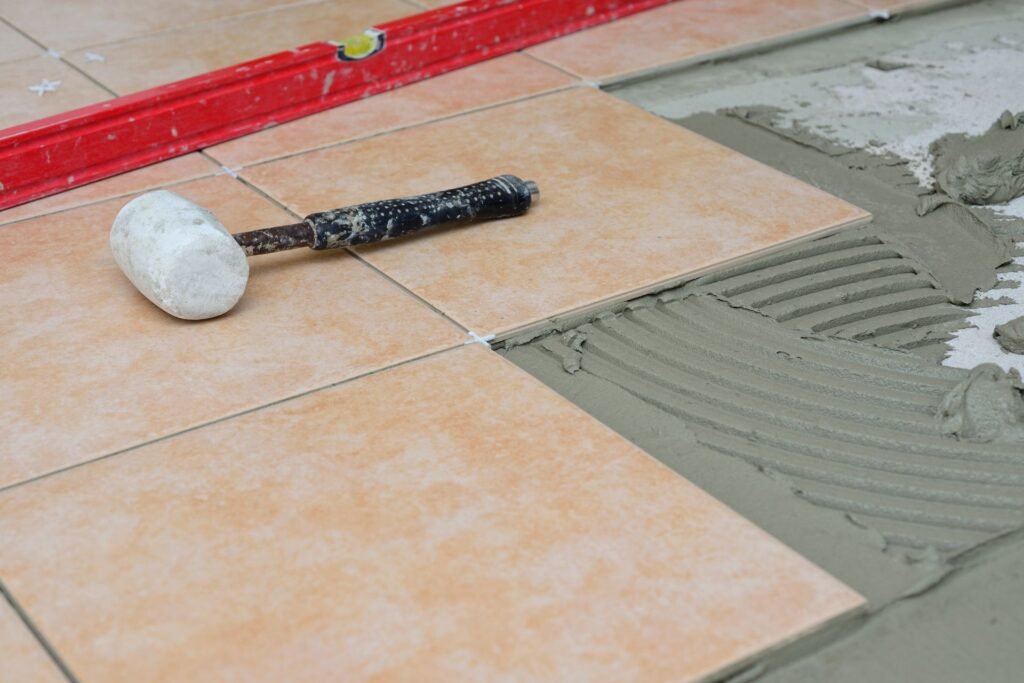
Hidden Costs To Consider When Replacing Bathroom Flooring
Subfloor Repairs
When replacing bathroom flooring, one of the most commonly overlooked costs is subfloor repairs. Bathrooms are high-moisture areas, and over time, water can seep beneath your tiles or flooring, causing damage to the subfloor. If the subfloor is damaged or uneven, it must be repaired or, in some cases, replaced before installing new flooring. This process adds to your total costs, as subfloor repairs can be labor-intensive and require specialized materials like plywood or cement boards. Even if your subfloor looks fine at first glance, it’s often only after the old flooring is removed that hidden issues become apparent, so it’s wise to budget for potential repairs ahead of time.
Waterproofing
Waterproofing is critical in bathroom flooring projects. Given the constant exposure to moisture, improper waterproofing can lead to long-term problems such as mold, mildew, and water damage. Quality waterproofing membranes or sealants are a necessity, and they come at a price. This extra step is often required by building codes and is non-negotiable when ensuring the longevity and durability of your bathroom flooring. While it might seem like an unnecessary expense at first, investing in proper waterproofing can save you thousands in future repair costs, making it an essential aspect of your renovation budget.
Removal and Disposal of Old Flooring
Many homeowners underestimate the cost of removing and disposing of the existing flooring. Whether you’re dealing with tiles, vinyl, or old linoleum, the removal process requires significant labor. Moreover, disposal fees for large amounts of old flooring materials can add up, especially if you need to transport them to a landfill. Hiring professionals to handle the removal will also drive up the cost, though it ensures that the job is done efficiently and without damaging other areas of your bathroom. Some companies offer disposal services, so it’s a good idea to ask if this is included in the total cost estimate when getting quotes.
Building Consents
In New Zealand, depending on the scope of your bathroom renovation, you may need to secure building consents. This is particularly true if you’re making significant changes, like moving plumbing fixtures, altering the structure, or replacing flooring in older homes. For homes built before certain regulatory changes, you might even need consent to ensure that any new work complies with current building standards. These consents add an extra layer of cost and time to your project, so it’s important to check with your local council before starting the renovation. While it might seem like a hassle, securing the proper permits ensures that your renovation is legally compliant and can help avoid fines or complications down the line.
By considering these hidden costs, you’ll be better prepared for the total expense of replacing your bathroom flooring. Proper planning and budgeting for subfloor repairs, waterproofing, removal and disposal of old flooring, and building consents can save you from any unpleasant surprises during your renovation process.

Cost Breakdown: Professional Vs. DIY Flooring Replacement
When it comes to replacing bathroom flooring, homeowners in New Zealand often face the decision of whether to hire a professional or attempt a DIY project. Each option has its own cost implications, time requirements, and potential risks. In this section, we’ll break down the key factors to consider, helping you make an informed choice based on your needs, budget, and experience level.
Hiring a Professional
Choosing to hire a professional contractor for your bathroom flooring replacement can come with a higher upfront cost but offers numerous benefits that may justify the expense.
Labor Costs in NZ
The cost of hiring a professional flooring contractor in New Zealand typically varies based on the region, type of flooring, and complexity of the job. On average, labor costs can range from $40 to $70 per hour, with total installation costs often falling between $600 to $1,200 depending on the size of the bathroom and the materials used. Additionally, more intricate jobs, such as laying tiles in a complex pattern or dealing with uneven subfloors, may increase labor fees due to the extra time and skill involved.
How to Choose a Contractor
Finding the right contractor is crucial for ensuring a smooth and successful flooring replacement. It’s recommended to gather quotes from multiple contractors, check online reviews, and ask for references. When comparing quotes, don’t just focus on price; consider experience, qualifications, and whether the contractor offers a warranty on their work. A reputable contractor will provide a clear breakdown of costs, timelines, and what is included in the job. A key tip is to verify that the contractor is licensed and insured, which protects you from potential liabilities.
Time Savings and Warranty Benefits
One of the main advantages of hiring a professional is the time savings. Professionals have the experience and tools to complete the job efficiently, often within a few days, whereas a DIY project may stretch over several weekends. Additionally, most professionals offer a warranty on their work, giving you peace of mind that if anything goes wrong post-installation, it will be fixed at no extra cost.
DIY Replacement
On the other hand, many homeowners are drawn to DIY flooring replacement as a way to save on labor costs and have greater control over the process. However, it’s important to weigh the potential savings against the time and effort required.
Cost of Tools and Materials
While you might save money by not paying for labor, DIY flooring replacement still comes with costs. Tools such as saws, tile cutters, adhesive spreaders, and protective equipment may need to be purchased or rented, adding anywhere from $100 to $500 to the project, depending on the tools you already own. Additionally, you’ll need to account for the cost of materials, such as underlayment, adhesive, grout, and of course, the flooring itself. Even if you’re handy, it’s crucial to invest in quality materials to ensure the longevity of your new bathroom floor.
Time Investment
DIY projects can be rewarding, but they are also time-consuming. Depending on your skill level and the complexity of the project, replacing bathroom flooring yourself can take anywhere from a few days to a couple of weeks. Tasks such as removing old flooring, leveling the subfloor, and properly installing the new floor are labor-intensive and require careful attention to detail. If you’re working on weekends or evenings, this can add up to a significant time investment.
Potential Risks and Long-Term Implications
The risks of DIY flooring replacement shouldn’t be overlooked. Mistakes during installation can lead to uneven flooring, gaps, or poor adhesion, which could result in costly repairs down the line. Moreover, if the subfloor has any moisture issues or structural damage, addressing these without professional guidance could lead to long-term problems, such as mold growth or floor instability. While DIY can save you money upfront, improper installation might reduce the lifespan of your new floor and potentially cost more in the long run.
When to Hire a Professional
There are certain situations where hiring a professional is the best course of action, even if you’re generally comfortable with DIY projects.
Complex Layouts
Bathrooms often have intricate layouts, with fixtures like bathtubs, showers, and toilets creating numerous nooks and corners. If your bathroom has an irregular shape or complex layout, installing the flooring precisely and seamlessly can be challenging. Professionals have the experience to navigate these obstacles, ensuring a polished finish that may be difficult for a DIYer to achieve.
Significant Subfloor Issues
If your bathroom has any underlying subfloor problems, such as rot, moisture damage, or an uneven surface, it’s crucial to address these before laying new flooring. While minor leveling can be handled DIY, more severe issues typically require the expertise of a professional to ensure the subfloor is stable and moisture-proof. Ignoring or improperly fixing subfloor issues can lead to more significant problems in the future, including costly repairs or even the need to replace the entire floor again.
Tile or Stone Flooring
Certain types of flooring, such as tile or stone, require specialized tools and skills to install correctly. Laying tile involves precision cutting, proper adhesive application, and grouting, which can be time-consuming and difficult to perfect without experience. If you’re set on tile or stone for your bathroom, it may be worth the investment to hire a professional who can guarantee a high-quality installation that will last for years.
Deciding between hiring a professional and going the DIY route depends on your budget, skill level, and the specifics of your bathroom flooring project. While DIY can save money upfront, it comes with risks and requires a significant time investment. On the other hand, professionals bring expertise, efficiency, and warranties to the table, potentially saving you money and stress in the long run.

Typical Price Ranges For Bathroom Flooring Replacement Across NZ
When considering the cost of replacing bathroom flooring across New Zealand, several factors come into play that can greatly influence the overall price, including location, availability of professionals, material choices, and the size of your bathroom. Here’s a breakdown of what you can expect based on the region.
Auckland: Higher Labor and Material Costs
In Auckland, the cost of living and demand for building services are higher compared to other parts of New Zealand. This means both labor and materials typically come at a premium. For bathroom flooring replacement, homeowners in Auckland may find themselves paying more due to the bustling economy and the fact that skilled labor is in high demand. On average, Auckland residents could expect to pay anywhere between $150 to $200 per square meter for flooring replacement, depending on the type of material chosen. Premium options such as tiles or natural stone may push the price even higher. The larger population and increased construction activity in Auckland also mean that finding a contractor can sometimes be competitive, further driving up costs.
Wellington: Mid-Range Costs
Wellington tends to sit in the middle of the price spectrum. While the capital city also faces the same issues as Auckland with the cost of living, it’s not quite as expensive. Here, bathroom flooring replacement costs generally range from $120 to $180 per square meter. Contractors are more readily available than in rural areas but less saturated than Auckland, which contributes to a more balanced price point. Wellington’s diverse architecture also provides opportunities for different flooring materials to be used, whether it’s hardwood, tile, or vinyl. Mid-range options such as luxury vinyl tiles (LVT) or porcelain tiles are common choices for homeowners looking for a balance between style and affordability.
Christchurch: Comparison of Pricing
Christchurch offers a unique comparison in pricing. With the rebuilding efforts post-earthquake, construction services have been in high demand for several years. However, this has led to competitive pricing among contractors. In Christchurch, you’re looking at bathroom flooring replacement costs that hover between $100 and $170 per square meter. The market here is often driven by rebuilding efforts and modernization projects, leading to a range of options from basic vinyl installations to higher-end ceramic tiles. Christchurch residents may find slightly more affordable rates compared to Auckland, but it’s worth noting that material availability can sometimes cause fluctuations in price.
Rural Areas: Travel Costs and Availability of Professionals
In rural areas of New Zealand, pricing for bathroom flooring replacement can vary significantly due to travel costs and the availability of professionals. If you live in a more remote location, expect to pay additional fees for travel time, which could add $20 to $50 per hour to the overall bill. Additionally, material costs can be higher due to the logistics involved in transporting goods to rural areas. This can drive the per-square-meter cost up to between $150 and $200, even for more basic materials like vinyl or laminate. The availability of contractors is often limited, meaning homeowners may need to plan well in advance to secure the necessary labor for their project.
Small vs. Large Bathrooms: How Size Affects Regional Pricing Differences
The size of your bathroom will have a direct impact on the cost of flooring replacement. Small bathrooms (5-10 square meters) will naturally cost less in terms of materials and labor than larger bathrooms (15-20 square meters or more). However, it’s important to note that smaller spaces can sometimes result in a higher cost per square meter, especially when factoring in minimum labor charges and the complexity of working in tight quarters. In Auckland, for example, a smaller bathroom may still cost upwards of $1,500-$2,000 for flooring replacement due to these factors, whereas a larger bathroom in Wellington might offer more flexibility in pricing due to bulk material savings and easier labor conditions. The larger the space, the more opportunity there is to negotiate with contractors and potentially save on material costs through bulk purchasing.

Tips To Save Money On Bathroom Flooring Replacement
Renovating a bathroom can be a costly endeavor, especially when it comes to flooring. However, there are several strategies that homeowners can implement to keep costs manageable without sacrificing quality or style. Here are some practical tips that can help you save money when replacing your bathroom flooring:
Shop Around for Quotes
One of the most effective ways to save money on bathroom flooring is to shop around for multiple quotes. Don’t settle for the first offer you receive; instead, reach out to a variety of contractors and suppliers. Each provider may have different pricing structures, material costs, or service fees. By comparing quotes, you’ll be able to find the best value for your money. Additionally, when contractors know you are getting multiple quotes, they may be more likely to offer competitive pricing, which can further lower your expenses. Take the time to review not only the price but also the quality of the materials and services being offered to make an informed decision.
Opt for Off-Season Renovations
Timing your bathroom renovation project can have a significant impact on the cost. Many contractors experience peak demand during the warmer months when homeowners are more likely to tackle renovation projects. By scheduling your bathroom flooring replacement during the off-season, such as in the winter or late fall, you may be able to negotiate lower labor rates and take advantage of seasonal discounts on materials. Contractors tend to have more availability during these times and may be more willing to offer a deal to secure work during slower periods. Planning your renovation during these off-peak times could result in substantial savings.
Consider Cost-Effective Materials
Choosing the right material for your bathroom flooring doesn’t have to break the bank. There are several cost-effective materials available that offer durability and aesthetic appeal. For instance, vinyl flooring is a budget-friendly option that is water-resistant, easy to install, and comes in a variety of styles that mimic more expensive materials like wood or stone. Similarly, ceramic tiles provide a long-lasting and affordable solution that can withstand the moisture and humidity of a bathroom environment. These materials are not only affordable upfront but also reduce the need for frequent repairs or replacements, saving you money in the long run.
Reuse or Refinish Where Possible
Before deciding to completely replace your bathroom flooring, consider whether refinishing or reusing existing materials is an option. In some cases, older floors can be refinished or repaired instead of being replaced entirely. For example, if you have hardwood or tiles that are still in good condition but look worn, you can restore them with refinishing techniques. This can involve sanding, resealing, or adding a new layer of finish to breathe new life into the flooring without the cost of a full replacement. Not only does this reduce waste, but it also helps you save significantly on material costs.
Look for Sales and Discounts
Being proactive about hunting for deals can make a big difference in your overall bathroom flooring replacement budget. Keep an eye out for seasonal sales, clearance items, and bulk buying discounts from suppliers. Many retailers offer discounts during holidays, end-of-year clearance events, or when they need to make room for new stock. Purchasing your materials during these sales can help you save a substantial amount. Additionally, buying in bulk might offer a discount per square meter of flooring material, especially if you’re renovating multiple rooms. Don’t hesitate to ask retailers if they have any special offers or upcoming sales that could help you save even more.

Case Studies: Examples Of Flooring Replacement Costs
Budget Bathroom
A budget bathroom renovation focuses on affordability while still achieving a functional and fresh appearance. One common choice for budget-conscious homeowners is vinyl flooring, which offers durability, water resistance, and ease of maintenance at a lower price point than other materials. Here’s a breakdown of the costs and the process involved in replacing vinyl flooring in a small bathroom.
- Flooring Material Cost: Vinyl sheets or vinyl tiles are often the go-to for budget bathrooms. On average, you can expect to pay $25 to $50 per square meter for vinyl. In a small bathroom measuring about 4 to 6 square meters, the total cost for the vinyl material could range from $100 to $300, depending on the quality and design.
- Labor Cost: Labor costs for vinyl installation are typically lower than for other flooring types, thanks to its ease of installation. Expect to pay around $200 to $400 for a basic install in a small bathroom, especially if the flooring is straightforward with minimal cutting and fitting required.
- Additional Expenses: You might also need to account for underlayment and baseboards, which could add $50 to $150 to the overall cost. Additionally, removing old flooring may incur an extra charge of $100 to $200.
- Process: The process begins with removing the old flooring, leveling the subfloor if necessary, and then cutting the vinyl to fit the bathroom layout. Vinyl is either glued down or laid as a floating floor, depending on the type you choose. Once installed, the edges are sealed, and any baseboards or trim are replaced.
A small budget bathroom flooring replacement might cost between $350 to $850, making it an affordable option for those looking for a quick and cost-effective update.
Mid-Range Bathroom
For a mid-range bathroom renovation, ceramic tiles are a popular choice, offering a balance between style, durability, and cost. Ceramic tiles come in a variety of designs, making them versatile for various bathroom aesthetics. Here’s a breakdown of the costs involved when opting for ceramic tile flooring in a larger bathroom.
- Flooring Material Cost: Ceramic tiles typically cost between $40 to $100 per square meter, depending on the design and quality. For a medium-sized bathroom of around 8 to 12 square meters, this puts the material cost between $320 and $1,200.
- Labor Cost: Professional installation is a must for ceramic tile, as it requires precise cutting, layout, and grouting. Labor costs range from $800 to $1,500 for a mid-range bathroom, depending on the complexity of the installation, such as patterns, inlays, or unique shapes.
- Additional Expenses: Don’t forget to budget for underlayment, grout, and possibly waterproofing. These additional materials can add between $150 and $300 to the total project cost.
- Process: Replacing flooring in a mid-range bathroom starts with removing the old flooring, ensuring the subfloor is level and dry, and installing an appropriate underlayment. Ceramic tiles are then laid out in a pattern, cut to fit where necessary, and adhered to the floor with mortar. Once the tiles are set, grout is applied between the joints to create a seamless look. The final step is sealing the grout to protect it from moisture.
The total cost for ceramic tile flooring in a mid-range bathroom can range from $1,270 to $3,000, depending on the materials selected and the complexity of the design.
High-End Bathroom
A high-end bathroom renovation emphasizes luxury and attention to detail. One common choice for premium bathrooms is natural stone tiles, such as marble, granite, or travertine. These materials not only enhance the elegance of the space but also increase the overall value of the home. Here’s a breakdown of the costs and considerations for high-end bathroom flooring.
- Flooring Material Cost: Natural stone tiles come at a premium, with prices ranging from $100 to $300 per square meter. For a large bathroom of 12 to 15 square meters, the total material cost can range from $1,200 to $4,500, depending on the type of stone and the quality of the finish.
- Labor Cost: Installation of natural stone requires skilled professionals due to the weight, complexity, and precision needed for a flawless finish. Labor costs for high-end bathroom flooring typically range from $2,000 to $4,000, as the process involves careful leveling, sealing, and sometimes intricate designs or patterns.
- Additional Expenses: Stone tile installation often requires a reinforced subfloor to support the weight, as well as high-quality grout and sealant to ensure longevity. These additional costs can add $500 to $1,000 to the total project.
- Process: The process begins with a thorough assessment of the subfloor to ensure it can support the weight of the natural stone. After removing the old flooring, any necessary reinforcements are added to the subfloor. The stone tiles are then cut, laid in place, and adhered using specialized mortar. Once the tiles are set, the grout is applied and sealed to prevent moisture penetration. Natural stone also requires sealing to protect against stains and wear over time, which adds to the overall labor intensity.
The total cost for a high-end bathroom flooring replacement with natural stone tiles can range from $3,700 to $9,500, depending on the materials, design, and labor required. However, the luxurious finish and durability make it a worthwhile investment for those seeking to create a spa-like retreat in their home.
These case studies highlight the range of costs and processes involved in replacing bathroom flooring, giving homeowners a clearer idea of what to expect at different budget levels.

How To Choose The Right Bathroom Flooring For Your Needs
Selecting the right bathroom flooring is one of the most critical decisions you’ll make during a bathroom renovation. The floor not only needs to look great but must also withstand the daily wear and tear that bathrooms experience. When choosing the perfect flooring, there are a few key factors to consider that will help ensure you get the best fit for your lifestyle and preferences.
Lifestyle Considerations: Family Size, Traffic, and Moisture Levels
When thinking about bathroom flooring, consider your household’s lifestyle first. The size of your family plays a significant role in determining the type of flooring you should choose. For instance, if you have young children or multiple people using the same bathroom daily, you’ll want a floor that can handle a lot of traffic. This means choosing materials that are scratch-resistant, easy to clean, and able to withstand heavy foot traffic.
Moisture is another major factor to keep in mind. Bathrooms are humid environments, and without the right flooring, water damage can become a real concern. Tiles such as ceramic or porcelain are excellent for handling high moisture levels. If your bathroom sees frequent use, these durable materials will be less prone to warping, cracking, or staining than softer flooring options like hardwood or laminate.
Additionally, think about comfort. Warmer, softer flooring like vinyl or cork might be preferable in smaller bathrooms with less foot traffic or where comfort underfoot is a priority, such as a bathroom attached to the master bedroom.
Design Preferences: Aesthetic Appeal vs. Functionality
Your design preferences will also shape your bathroom flooring choice. Flooring is a major visual element in any bathroom, so its style should reflect your personal taste while complementing the overall design of the space.
Are you aiming for a sleek, modern look? Stone or large porcelain tiles can give your bathroom a clean, polished finish. On the other hand, if you’re leaning towards a more traditional, cozy vibe, wood-look tiles or waterproof luxury vinyl planks can offer the warm aesthetic of natural wood without the risk of water damage.
That said, functionality should never be sacrificed for design. While carpet might feel soft and cozy, it’s generally not recommended for bathrooms because it holds onto moisture, which can lead to mold and mildew issues. A good rule of thumb is to strike a balance between aesthetic appeal and practical durability. Flooring materials like porcelain, ceramic, and vinyl often blend these two considerations well, offering both beauty and resilience.
Long-Term Durability vs. Short-Term Costs: Weighing Your Options
Budget often plays a large role in renovation decisions, and bathroom flooring is no exception. However, it’s essential to weigh the upfront costs against long-term durability. For instance, cheaper materials like laminate or peel-and-stick vinyl tiles may be easy on the wallet, but they may not hold up as well over time, especially in a moisture-rich environment like a bathroom.
Investing in high-quality materials such as porcelain tiles, waterproof vinyl planks, or even natural stone can save you money in the long run by reducing the likelihood of costly repairs or replacements. These materials tend to be more durable and are better suited for handling the daily rigors of bathroom use.
It’s also wise to think about the future. Do you plan on staying in your home for many years to come, or is this renovation part of a larger effort to increase your home’s resale value? If resale is a consideration, potential buyers may appreciate the longevity and aesthetic appeal of higher-end materials, making them a worthwhile investment.
Selecting the right bathroom flooring involves more than just picking something that looks good. It’s about considering your household’s needs, weighing your design preferences against functionality, and making a decision that aligns with both your budget and long-term goals. By taking the time to evaluate these factors, you’ll be able to choose a flooring material that meets your needs both now and in the years to come.

FAQs: About Cost To Replace Flooring In Bathroom NZ
What is the average cost to replace bathroom flooring in NZ?
The average cost to replace bathroom flooring in New Zealand typically ranges from $100 to $250 per square meter, depending on the material used, labor costs, and the size of the bathroom. Additional costs may include removal of the old flooring, subfloor repairs, and waterproofing.
Which bathroom flooring materials are the most cost-effective?
Vinyl flooring is often the most cost-effective option for bathrooms due to its affordability, water resistance, and ease of installation. Other budget-friendly materials include laminate and basic ceramic tiles.
How much does it cost to hire a professional to replace bathroom flooring in NZ?
Hiring a professional in New Zealand can cost anywhere from $50 to $100 per hour, with total labor costs depending on the complexity of the installation and the size of the bathroom. In general, labor for a small to mid-sized bathroom can add $500 to $2,000 to the total cost.
Is it cheaper to replace bathroom flooring myself?
DIY replacement of bathroom flooring can save on labor costs, but you’ll need to factor in the cost of tools, materials, and potential mistakes. DIY projects may be cheaper for smaller bathrooms with simple flooring, but complex installations or damaged subfloors may require professional assistance.
What hidden costs should I consider when replacing bathroom flooring?
Hidden costs may include subfloor repairs, especially if there’s water damage or mold. Other potential costs include waterproofing, disposal of old flooring, and any building consents required for extensive renovations.
How do bathroom size and layout affect the cost of replacing flooring?
The size of the bathroom directly impacts the cost of materials and labor. Larger bathrooms will require more flooring, while complex layouts with more angles or features like built-in fixtures may increase labor costs due to the added time and precision needed for installation.
What are the most durable bathroom flooring options?
Durable options for bathroom flooring include ceramic and porcelain tiles, natural stone tiles, and waterproof engineered wood. These materials tend to withstand moisture and wear over time, making them ideal for high-traffic areas like bathrooms.
Do I need to replace the subfloor when replacing bathroom flooring?
If your subfloor is damaged by moisture or wear, it may need to be repaired or replaced before new flooring can be installed. Subfloor repairs can add anywhere from $200 to $1,000 to the overall cost, depending on the extent of the damage.
How long does it take to replace bathroom flooring?
The time required to replace bathroom flooring depends on the size of the bathroom, the type of material being installed, and whether subfloor repairs or waterproofing are necessary. For a small to mid-sized bathroom, professional installation typically takes 2 to 4 days.
What are some tips to reduce the cost of replacing bathroom flooring?
To reduce costs, consider opting for budget-friendly materials like vinyl or laminate, getting multiple quotes from contractors, and timing your renovation during off-peak seasons when prices may be lower. Additionally, purchasing materials during sales or discounts can help minimize expenses.
Conclusion
In conclusion, choosing the right material for your bathroom flooring is crucial, not just for aesthetics but also for durability and moisture resistance. It’s essential to understand the costs involved in replacing your bathroom flooring, as this can vary widely depending on the material, labor, and any unexpected repairs. We encourage you to take the time to assess your specific needs, gather multiple quotes from reputable contractors, and plan your renovation with a clear budget in mind. With thoughtful planning and attention to detail, replacing your bathroom flooring can be a seamless and cost-effective upgrade that significantly enhances both the comfort and value of your home. Now is the time to take the next step—start researching, ask questions, and begin your journey towards a beautiful and functional bathroom.
About the Author:
Mike Veail is a recognized digital marketing expert with over 6 years of experience in helping tradespeople and small businesses thrive online. A former quantity surveyor, Mike combines deep industry knowledge with hands-on expertise in SEO and Google Ads. His marketing strategies are tailored to the specific needs of the trades sector, helping businesses increase visibility and generate more leads through proven, ethical methods.
Mike has successfully partnered with numerous companies, establishing a track record of delivering measurable results. His work has been featured across various platforms that showcase his expertise in lead generation and online marketing for the trades sector.
Learn more about Mike's experience and services at https://theleadguy.online or follow him on social media:

